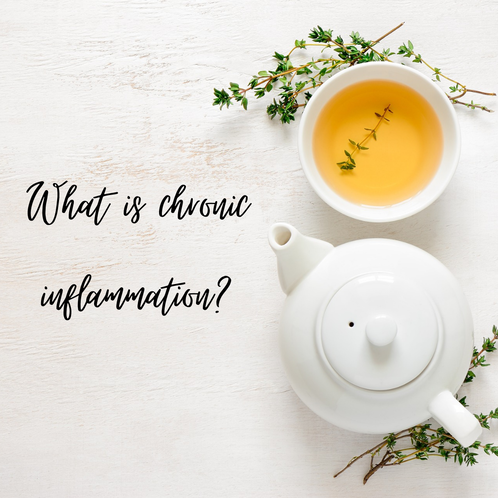 Inflammation has become a buzz word in our modern health landscape. In the biochemical reality of our bodies, it's actually a pretty complex thing, but the benefit of thinking of things from an inflammation perspective is that we can see the relationships between many conditions and diseases that we never would have connected otherwise - from depression to diabetes to arthritis. But let's start with the reason inflammation exists. It's actually a healthy process that happens in our bodies in response to injury or infection, for example. There's a trigger, an inflammatory cascade that usually involves redness, warmth, swelling, some loss of function, and some pain, and then resolving of those symptoms as the injury or infection is healed. Inflammation can be visible or invisible, on the surface of the skin or deep within the body. Either can be perfectly normal. But too often, when the conditions are right, the inflammation happens at the wrong time and/or doesn't do anything productive and/or doesn't go away when it should. And that's what we call chronic inflammation. Inflammation is often totally hidden from view unless you know where to look. I like to imagine chronic inflammation as a fire, smoldering throughout a person's body, showing up in all kinds of different places and ways. As time has gone by and more and more research has been done on inflammation, we've found it connected with all kinds of diseases we might never have imagined. All the diseases that end with -itis (arthritis, bursitis, myelitis, hepatitis, sinusitis... you get the idea) are diseases of inflammation. But then there are diseases like heart disease, diabetes, allergies, COPD, chronic fatigue, depression, irritable bowel syndrome (IBS), Crohn's disease, fibromyalgia, and many, many more. The symptoms of these disease are variable depending on the area that is affected first. But we see a lot of commonalities in them when we start to look inside the person. Just like acute inflammation causes pain, often, so too does chronic inflammation. It may be isolated to one area of the body, or it may be wide-spread. Just like acute inflammation causes loss of function, often, so too does chronic inflammation. Again, it is sometimes specific to one area of the body or brain, and other times to the body as a whole. From an internal perspective, we often see metabolic abnormalities (changes in the way that energy is created and stored), hormonal imbalances, organ dysfunction, elevated stress indicators (such as cortisol), dysbiosis (imbalance of the bacteria living in the gut), changes in immune function, and changes in the permeability of some of the important membranes in the body (like the intestinal wall and the blood-brain barrier). All of these diseases are caused by a complex network of triggers. Our genetics often plays a role, but is generally not our destiny. Sometimes, there is one major trigger that sets the whole body ablaze with inflammation. Often, it's a combination of multiple factors: genetics, prenatal and early life triggers, stress (including trauma), environmental triggers, dietary and lifestyle triggers, chronic infections, and more. That means that treating just one of these factors alone is usually not enough. We have to treat holistically (the whole person). Modern medicine tends to treat the symptoms of all of these conditions, usually with medication. But trying to heal chronic inflammation by merely treating the symptoms of chronic inflammation is like trying to put out a campfire by blowing out your burning marshmallow. It often allows people to be able to function again, which is amazing and wonderful and totally not to be discounted. And medication certainly may be a part of a holistically-built long-term treatment plan. But often, it only masks the problem in one area of the body or mind, only to see it crop up again in another area. A better approach? Let's dig down and find the root causes of the chronic inflammation. Let's find the underlying imbalances in the body and mind. Let's treat those, with gentle, compassionate care.
0 Comments
 The brain is a complex and incredible thing. When you think about everything it does, from keeping us breathing to playing the piano to swimming laps to doing complex calculus to learning languages to inventing new electronics to falling in love... it's easy to imagine why some things go wrong. Why the brain needs so many different nutrients to do all the different things it does. Why it uses an incredible amount of energy to do its job. Why it is so sensitive to changes in the environment. Nutritional psychiatry and its sister, nutritional psychology, are the new realms of research and clinical practice that are looking into how we can support brain function and treat mental illness with nutrition. We know that some diet patterns can help to improve symptoms of mental illness, and that while there are some stand-out foods and nutrients, a whole-diet approach seems to be the best approach. We also know that nutritional deficiencies are common in the US population in general, but that they seem to be even more common in those with mental health challenges. We also know that the microbiota-gut-brain axis plays a huge role in our mental and emotional wellbeing and resilience. I believe nutritional psychiatry works best in combination with therapy, exercise, and in some cases, mental health medications that work together with nutritional approaches to treat the mental illness. Because mental illness is often multifactorial in cause, we also need to use multiple modalities to treat it. However, nutrition is an incredibly powerful tool that can benefit everyone working on their mental and emotional wellness.
|
AuthorErica Golden, RDN Archives
March 2024
Categories |
 RSS Feed
RSS Feed
